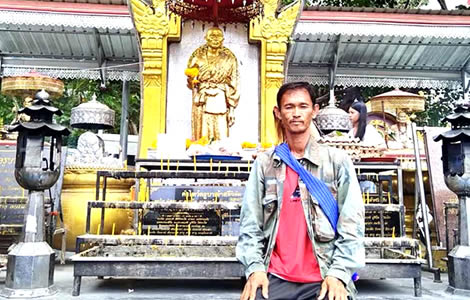“I was a ghost,” said 46-year-old Piya after walking 700km to kick a decades-long cannabis addiction. Greeted with support in Chiang Mai, he now plans to return home by bike to honour his mother—just as global studies warn of weed’s deadly health risks.
A 46-year-old man from Ratchaburi who had previously quit cannabis and embarked on a personal pilgrimage to Chiang Mai completed his journey on Friday. Mr. Piya, also known as Oat, was warmly welcomed in Chiang Mai by officials from the Office of the Narcotics Control Board (ONCB), who offered him a place to rest and support in recognition of his accomplishment. As a gesture of encouragement, ONCB officers later provided him with new running shoes, some cash and a bicycle to help him make his return journey to Ratchaburi. There, he plans to pay tribute to his 74-year-old mother, whose love and concern inspired him. Mr. Piya’s story has resonated with many, particularly as it coincides with the release of a major international study involving 400 million participants, which confirmed the serious health risks associated with cannabis use. Speaking on Friday, Mr. Piya said cannabis had nearly destroyed him—mentally and physically—turning him, in his words, “into a ghost.”

A 46-year-old man from Ratchaburi has completed a remarkable 700-kilometre walk to Chiang Mai. He made the journey not for fun, fitness or fame—but to break free from a decades-long marijuana addiction.
Known by his nickname “Oat,” Mr. Piya began smoking marijuana in Grade 4. For over 30 years, he remained trapped in addiction. He later also used opium, heroin and methamphetamine. While he quit opium and heroin years ago, he only stopped using meth two years back. Marijuana, however, was the hardest to let go.
On May 18, 2025, he left his home in Ratchaburi with nothing more than a single set of clothes. He carried no money and had no plan beyond quitting. Still, he made a personal vow.
Emotional vow to his mother drove the decision to walk 700 km in a desperate fight to reclaim his life
“If I can’t stop, I won’t come back to see my mother again,” he said.
His 74-year-old mother had grown sick from worry. She cried often and feared for his life. That fear became his final push. He decided to walk to Chiang Mai to prove to himself—and his family—that he could change.
Along the way, he received emotional support. His mother and younger sister called him regularly to encourage him. He said these moments of connection helped him continue when his legs and will began to weaken.
Wherever night fell, he slept—sometimes in temples, sometimes under pavilions, sometimes in police booths. Despite the hardship, he pushed forward.
“I had nothing but determination,” he said. “I was tired, hungry, sore, but I knew I had to keep walking.”
By June 20, 2025, Oat arrived safely in Chiang Mai after 30 full days on foot. His arrival was met with warmth and respect.
Chiang Mai officials welcome him with care, comfort, and support after his thirty-day solo pilgrimage
Officials from the Office of the Narcotics Control Board (ONCB) Region 5 and Region 6 greeted him. Among them were Mr. Thanwa Phutphong, Director of Region 5, and Mr. Danucha Chaiwong, Director of Law Enforcement and Administration. They offered him a clean place to rest, water, food and care.
More importantly, they gave him what he needed most—encouragement and dignity.
Oat was deeply moved. His voice trembled as he thanked the officers, crying as he spoke.
“I’m just so happy,” he said. “For the first time in my life, I don’t crave marijuana anymore.”
Notably, he passed a marijuana shop while waiting to meet ONCB staff. In the past, he would have gone straight in. This time, he felt nothing.
“I didn’t even think about smoking,” he said. “That’s when I knew I was really free.”
Before leaving Chiang Mai, ONCB officers helped him visit sacred religious sites. He prayed for strength and a new life. They also gifted him a bicycle for his return trip. He had told them he wanted to cycle home to honour his mother.
With fresh clothes and a new bike, he begins his return home to honour his 74-year-old mother’s love
Officers gave him new clothes, sports shoes, a bag, bottled water and some cash. This support, he said, felt like a fresh start.
“I want to go home, kneel, and kiss my mother’s feet,” he said. “Then I’ll find honest work and begin again.”
His story has attracted wide attention across Thailand. Many have praised his courage and determination.
Moreover, it comes at a time when concerns about cannabis are rising globally. New medical studies are raising alarm over its long-term use.
A major international survey recently published in Heart, a peer-reviewed journal, shows troubling results. Researchers analyzed 24 studies conducted between 2016 and 2023. These involved over 400 million participants, mostly aged 19 to 59.
According to the study, cannabis users are 29% more likely to develop Acute Coronary Syndrome. This condition involves reduced blood flow to the heart, which can lead to heart attacks.
Landmark international study confirms long-term marijuana use raises risk of stroke and heart disease
Additionally, cannabis users were found to be 20% more likely to suffer from strokes than non-users.
These results are consistent with previous findings. Earlier studies also linked cannabis use to increased cardiovascular risk.
Researchers now warn that all patients with heart conditions should be screened for cannabis use.
Even occasional users face elevated risks. Dr. Ahmed Mahmoud of Boston University says marijuana increases heart rate and blood pressure.
“It can cause tiny injuries to the inner walls of coronary arteries,” he said. “This may trigger clot formation and block oxygen flow.”
That oxygen shortage can damage the heart, leading to heart attacks or strokes.
Marijuana’s impact on blood pressure and heart rate presents real dangers even for casual or young users
Furthermore, the CDC reports that cannabis affects the cardiovascular system in multiple ways. Most research has focused on smoking, but other methods like edibles may pose similar risks.
One recent study found that marijuana users under age 50 were 6.2 times more likely to suffer heart attacks. They were also 4.3 times more likely to experience ischemic strokes.
These statistics show that cannabis is not as harmless as once believed.
For Oat, these risks are no longer theoretical. He said marijuana nearly destroyed his body and mind.
“I used to smoke until I passed out,” he said. “I felt like a ghost, I couldn’t stop.”
Former addict says he felt like a ghost before a walk that transformed his body, mind and purpose in life
Yet, his 700-kilometre walk brought not only healing but a new sense of purpose. He credits the support of strangers as well as his family for helping him stay on track.
“I thank the people of Sukhothai, Tak, Lampang, Lamphun, and Chiang Mai,” he said. “Your kindness kept me going.”
Another UK tourist couple arrested with a £1 million haul of cannabis after their holiday in Thailand. Pot crackdown plan
Cannabis regulatory regime expected in June ending pot free for all with medical certification needed to buy the drug
Now, he hopes to inspire others facing addiction. His story shows that recovery is possible, even after decades of struggle.
He says it begins with a clear decision and one small, determined step forward.
“I never thought I could live without it,” he said. “But I did. And so can anyone.”
Join the Thai News forum, follow Thai Examiner on Facebook here
Receive all our stories as they come out on Telegram here
Follow Thai Examiner here
Further reading:
Health Minister Somsak launches regulatory blitz to outlaw non-medical cannabis use within 40 days
Outbound cannabis smuggling smashed by Chiang Mai police. Europe and London presently targeted
Buriram cannabis factory raided for illegal Vietnamese staff as drugs czar declares a new regime
UK ambassador meets top Thai officials to further plans to rein in cannabis as smuggling surges
UK holiday maker to Thailand lands in Heathrow Airport London with £1 million worth of cannabis


















